The religious composition of the 118th Congress
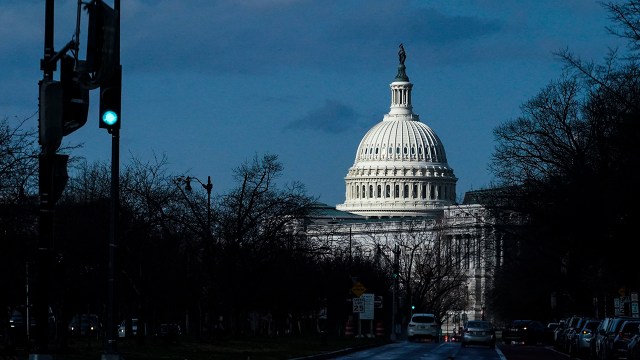
Every two years, Pew Research Center analyzes the religious affiliation of members of the incoming Congress. This report is the eighth in the series, which started with the 111th Congress that began in 2009.
Data on members of Congress comes from CQ Roll Call, which surveys members about their demographic characteristics, including religious affiliation. Center researchers then code the data so that Congress can be compared with U.S. adults overall. For example, members of Congress who tell CQ Roll Call they are “Southern Baptists” are coded under the broader “Baptists” category.
Data in this report covers voting members of Congress sworn in on Jan. 3, 2023. This analysis includes 534 members of Congress rather than the full 535 because Congressman Donald McEachin of Virginia’s 4th District was reelected in November but died before the swearing-in; his seat will go unfilled until a February special election.
Data for all U.S. adults comes from multiple sources, including Pew Research Center’s 2021 National Public Opinion Reference Survey (NPORS), conducted May 29-Aug. 25, 2021; a survey on the Center’s American Trends Panel conducted Sept. 20-26, 2021; and the Center’s survey of Jewish Americans conducted Nov. 19, 2019-June 3, 2020. Here is more information about how Pew Research Center measures the religious composition of the United States.
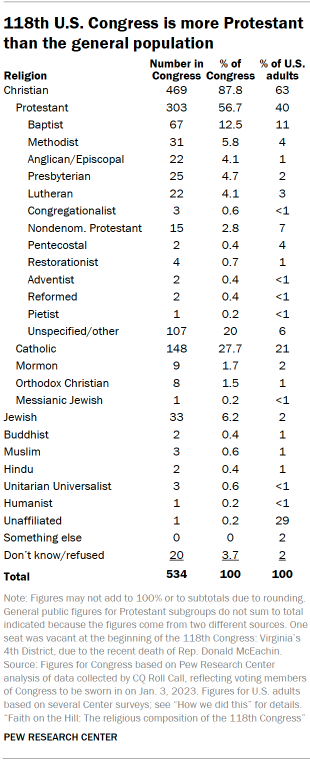
As it begins its 118th session, the U.S. Congress remains largely untouched by two trends that have long marked religious life in the United States: a decades-long decline in the share of Americans who identify as Christian, and a corresponding increase in the percentage who say they have no religious affiliation.
Since 2007, the share of Christians in the general population has dropped from 78% to its present level of 63%. Nearly three-in-ten U.S. adults now say they are religiously unaffiliated, describing themselves as atheist, agnostic or “nothing in particular,” up from 16% who did not identify with a religion 16 years ago. But Christians make up 88% of the voting members of the new 118th Congress being sworn in on Jan. 3 – only a few percentage points lower than the Christian share of Congress in the late 1970s. In the 96th Congress, which was in session in 1979-1980, 91% of members of Congress identified as Christian.
Just like in recent sessions, only one member of the new Congress – Sen. Kyrsten Sinema, independent of Arizona – identifies as religiously unaffiliated. Another (Democratic Rep. Jared Huffman of California) describes himself as humanist, and 20 are categorized as having unknown religious affiliations. Most of these members declined to state a religious affiliation when they were asked by CQ Roll Call, which serves as the primary data source for this analysis.
That said, the 469 Christians (out of 534 total members) at the start of the 2023-2024 session comprise – by a smidgen – the lowest number since Pew Research Center began analyzing the religious affiliation of the House and Senate for the 2009-2010 session.1 During the eight most recent sessions, the number of Christians in Congress was above 470, and it exceeded 500 as of 1970.2
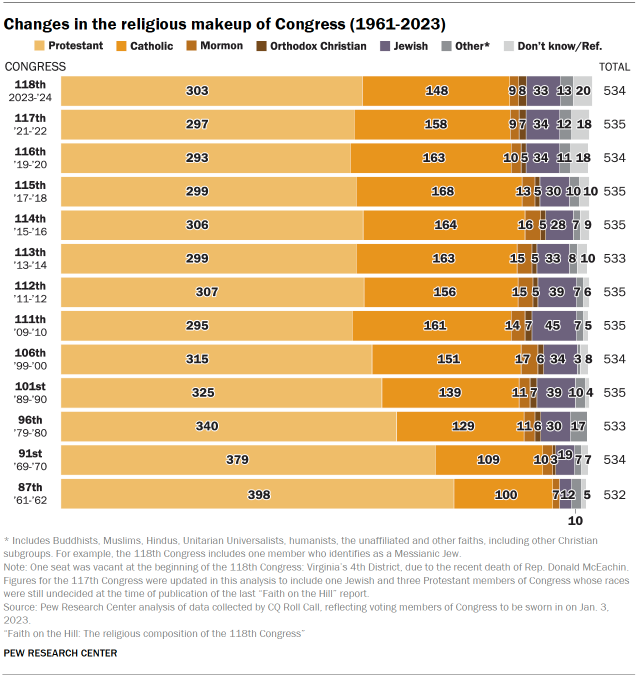
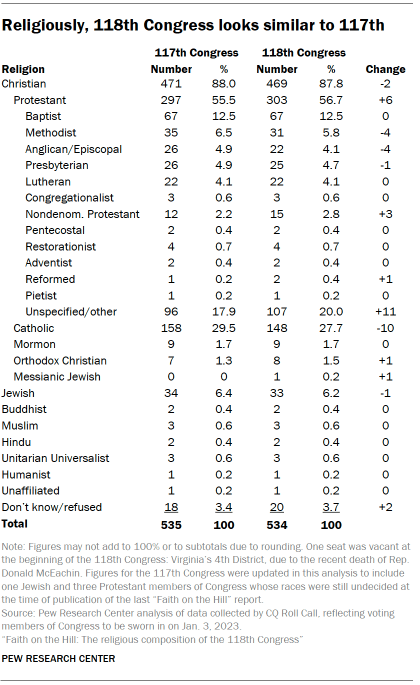
There are 303 Protestants in the new Congress, an increase of six from the previous Congress and the first time in four sessions (since 2015-2016) that the number has topped 300. The number of Protestants who do not specify a particular denomination or denominational family – providing vague or broad answers such as “Protestant,” “Christian” or “evangelical Protestant” – rose from 96 to 107, continuing a recent trend.3 And the number who specifically identify as nondenominational Protestants rose from 12 to 15.4
Two Protestant denominational families – Methodists and Episcopalians – each have four fewer members in the 118th Congress, with Methodists down to 31 and Episcopalians down to 22. And Presbyterians have one fewer member (25). These groups also have gone through broader membership declines in the U.S. in recent decades.
The new Congress has 148 Catholics, 10 fewer than the 117th. Still, Catholics make up about 28% of the members of Congress, a greater share than in the U.S. population overall (21%).
The number of members of the Church of Jesus Christ of Latter-day Saints (sometimes called Mormons) in Congress remained the same (nine). There are eight Orthodox Christians in the 118th Congress, one more than there was at the start of the previous session. Rep. Mary Peltola, D-Alaska, is an Orthodox Christian who joined the House of Representatives later during the 117th Congress after a special election. Peltola, who identifies with the Russian Orthodox Church, was reelected to her first full term in November.
There is now one member of Congress who identifies as a Messianic Jew – Republican Rep. Anna Paulina Luna, a new member from Florida who also has publicly described herself as a Christian.
Sixty-five members of the 118th Congress are not categorized as Christian, a slight uptick from 64 in the previous session. Two more members than in the 117th Congress either declined to describe their religious identity or otherwise have unknown affiliations; 20 members now fit this description. This includes Republican Rep. George Santos of New York, a newcomer to Congress who was moved to this category following revelations that he misrepresented parts of his life story and resume during his 2022 midterm campaign. Santos described himself as Jewish during the campaign but later told the New York Post that he is “clearly Catholic” and that he had only said he was “Jew-ish” because he had heard stories about his grandmother converting from Judaism to Catholicism.
Otherwise, there is general stability in the numbers of members of other non-Christian religious groups. Jews make up a slim majority of the non-Christian members of Congress, although the number of Jews has decreased by one from the 117th session (which had 34 Jewish members) to the 118th (33). Jews continue to make up 6% of the members of Congress, a greater share than they do of the general population (2%).
There are three Muslims – André Carson, D-Ind.; Ilhan Omar, D-Minn.; and Rashida Tlaib, D-Mich. – and two Hindus (Ro Khanna, D-Calif., and Raja Krishnamoorthi, D-Ill.) in the House, all of whom won reelection in 2022. The two Buddhists in Congress, Rep. Hank Johnson, D-Ga., and Sen. Mazie K. Hirono, D-Hawaii, also are returning members. Muslims, Hindus and Buddhists all are represented in Congress in about equal proportion to their respective shares of the U.S. population (roughly 1% or less each).
The three members of Congress who identify as Unitarian Universalists (Reps. Deborah Ross of North Carolina and Ami Bera and Judy Chu of California) also are returning, as are Huffman (the lone humanist) and Sinema (the only member who describes herself as religiously unaffiliated).
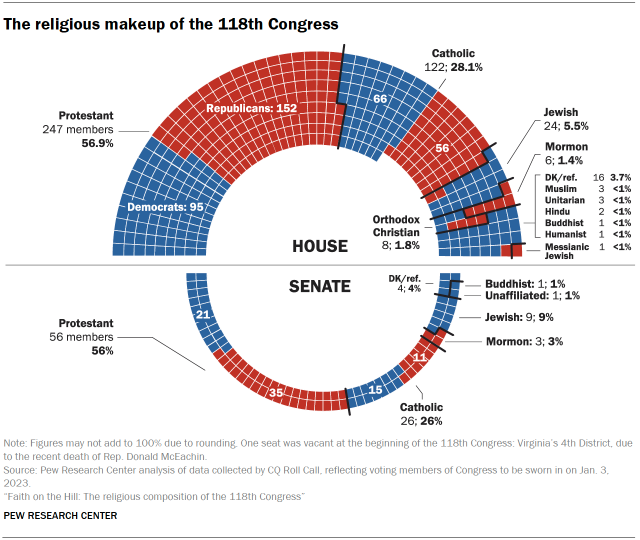
These are among the key findings of an analysis by Pew Research Center of CQ Roll Call data on the religious affiliations of members of Congress, gathered through questionnaires and follow-up phone calls to candidates’ and members’ offices.5 The CQ questionnaire asks members what religious group, if any, they belong to. It does not attempt to measure their religious beliefs or practices. The Pew Research Center analysis compares the religious affiliations of members of Congress with the Center’s survey data on the U.S. public.
Differences by chamber
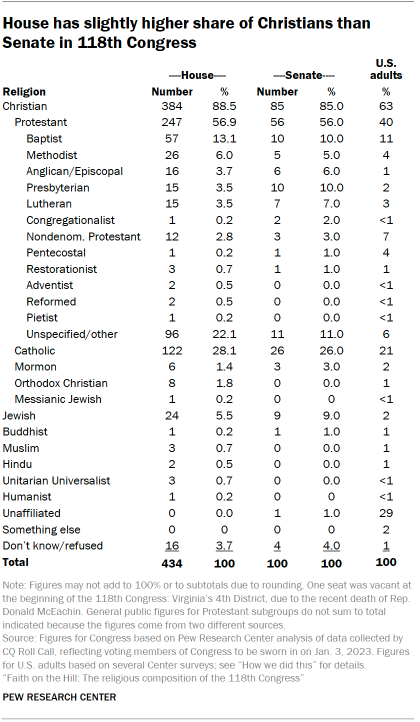
Both the Senate and the House are numerically dominated by Christians, with each chamber having a similar Protestant majority (57% in the House, 56% in the Senate). Looking at Protestant subgroups, Baptists make up a slightly larger share of the House (13%) than the Senate (10%). Episcopalians, Presbyterians, Lutherans and Congregationalists comprise larger shares in the Senate than in the House.
Catholics account for a slightly greater share of House than Senate members (28% and 26%, respectively). There are eight Orthodox Christians in the House, but none in the Senate.
Looking at non-Christian religions, Jews have a wider presence in the Senate (9%) than in the House (6%). There is one Buddhist in the House, Democratic Rep. Hank Johnson of Georgia, and one in the Senate, Democrat Mazie K. Hirono of Hawaii. All of the Muslims, Hindus and Unitarian Universalists in Congress are in the House.
Differences by party
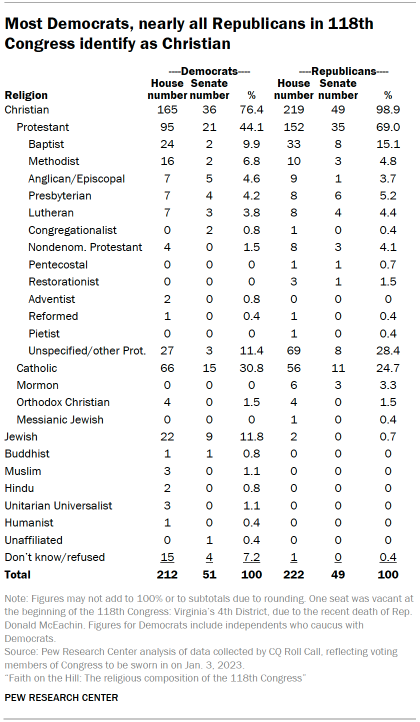
Large majorities of both Republicans and Democrats in Congress identify as Christian, although there is still a substantial gap between the two parties. While nearly all congressional Republicans – 268 out of 271, or 99% – describe themselves as Christians, the same is true for about three-quarters of Democrats (201 out of 263, or 76%). Both parties are more heavily Christian than are U.S. adults as a whole (63%).
Democrats in Congress also are much less likely than Republicans to identify as Protestant (44% vs. 69%), but a greater share of Democrats than Republicans are Catholic (31% vs. 25%).
Among the Democrats in both chambers combined, 12% are Jewish. An additional 7% did not specify a religious affiliation when they were asked, accounting for 19 of the 20 members of Congress overall whose affiliations are unknown. All the Unitarian Universalists, Muslims, Buddhists and Hindus in Congress are Democrats, and there is one Democrat who identifies as humanist (Rep. Jared Huffman of California).
The lone member of Congress who describes herself as religiously unaffiliated is Sen. Kyrsten Sinema of Arizona, who recently switched her party affiliation from Democratic to independent. She is counted as a Democrat in this analysis because she has said she will not caucus with Republicans.6
Nearly seven-in-ten Republican members of Congress identify as Protestants (69%). While many identify with a specific denomination or a broader denominational family such as Baptist (15%), Methodist (5%) or Presbyterian (5%), 28% of Republicans are Protestants who do not specify a denomination. This includes those who describe themselves as just “Christian,” those who say they are just “Protestant,” and a few who call themselves “evangelical Christian” or “evangelical Protestant.” This “Unspecified/other” Protestant category does not include the additional 4% of GOP members who describe themselves as nondenominational Protestants.
All nine members of the Church of Jesus Christ of Latter-day Saints (sometimes called Mormons) in Congress are Republicans. The one member who identifies as a Messianic Jew, Florida newcomer Rep. Anna Paulina Luna, is also a Republican. Orthodox Christians, meanwhile, are evenly split between the two parties, with four Democrats and four Republicans.
Two Republicans in Congress are Jewish: returning Rep. David Kustoff of Tennessee and freshman Rep. Max Miller of Ohio. Another Republican newcomer, Rep. George Santos of New York, was initially coded as Jewish but is now categorized as “Don’t know/refused” following the admission that he misrepresented parts of his life story, including his Jewish heritage.
First-time members
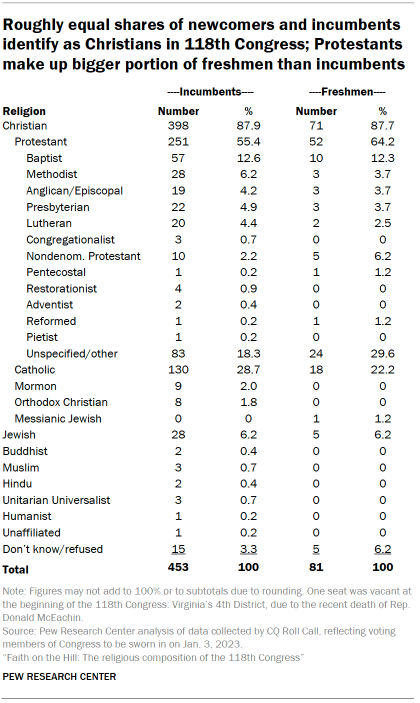
While the share of the U.S. population that is Protestant continues to decline, newcomers to Congress are substantially more likely than returning members to identify as Protestant: Nearly two-thirds of freshmen (64%) are Protestants, compared with 55% of incumbents.
Nearly 30% of all newcomers describe themselves as just “Christian,” “Protestant,” “evangelical Christian” or “evangelical Protestant,” compared with 18% of returning members who fall into this “Unspecified/other” Protestant category. An additional five new members (6% of all freshmen) specifically describe themselves as nondenominational Protestants, versus 2% of returning members.
At the same time, newcomers are just as likely as incumbents to identify as Christian (88% each), in part because Catholics are less prevalent among freshmen than among returning members (22% vs. 29%).
There also are nine members of the Church of Jesus Christ of Latter-day Saints and eight Orthodox Christians among the incumbents. No newcomers identify with either of these groups.
Jewish members of Congress make up 6% of all freshmen, identical to the share of Jewish returning members. There are no Buddhists, Muslims or Hindus among freshmen members of Congress, and the religious affiliations of five congressional newcomers – including Santos – are unknown.


